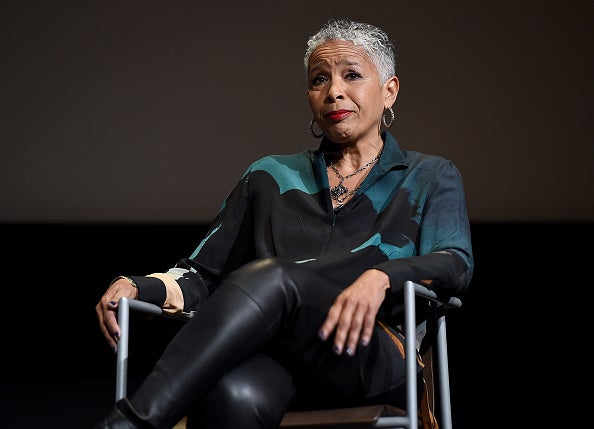
Twenty years ago, there was no Black girl Twitter, no wicked smart sisters with thumbs of fire like April Reign (@ReignofApril), who clap back at injustice and rally the masses in seconds with brilliant hashtags like #OscarSoWhite.
Twenty years ago, there was — for a time — only one Black woman regularly directing for television, the first African-American woman filmmaker to be nominated for an Oscar for her live action short, Tuesday Morning Ride.
Dianne Houston. Know her.
I recently sat around Houston’s generous Moroccan style stone fireplace, absorbing a breathtaking view of the Hollywood Hills while sipping some exotic ginger and cinnamon infused concoction as she coolly handled the storm of requests and questions that come in the final days of delivering a film — a day in the life of a bossed up Black woman with a family.
Bearing witness to Ms. Houston managing the attention of her two creatively demanding teens, quietly powerful wife, house guests, production assistants and a tiny but enormously needy dog — while still maintaining a Buddha-like focus on our conversation — was a master class in grown Black women intersectional realness.
And in that space, Houston offered me a snapshot of a pioneering Black woman director’s divine journey in filmmaking, from Tuesday Morning Ride to her latest project, Michael Jackson: Searching For Neverland.
Michaela Angela Davis:
While you’re certainly not new to this, you haven’t directed a film in a while. How is this like, or decidedly different from Tuesday Morning Ride?
Dianne Houston:
Tuesday Morning Ride was a journey of women, mostly Black women, from my mom, to my mother-in-law, to my yogini, Konda Mason, to my friend, Oprah (who helped finance the film). Searching for Neverland is a much more diverse endeavor, but there was still a village of Black women at the core helping me create and thrive through the work. But girl, back when making Tuesday, I was broke and making a film was a kitchen table effort. We have Black Twitter now; then we had one Black person who knew another Black person. Hand-to-hand pony express
MAD:
Michael Jackson, though?
DH:
Some things are just supposed to happen. Many years ago, Michael Jackson and I had several conversations about doing something together — a film, a play, a children’s book — something. Life got busy for me, and for Michael, life got terrifying. I never heard from him again after the trial, and we never worked together…until I made this film.
MAD:
Whoa, you knew MJ? While so radically free as an artist, he seemed bound and heavily burdened personally. I can’t begin to image a limelight so constant and bright. I’m sure he would be pleased knowing someone he trusted was directing this story.
DH:
I can tell you with utmost belief that Michael’s spirit, soul, presence was with us on the Searching For Neverland set. There was so much love on that set, so much reverence, so much care.
MAD:
But how did Searching for Neverland even get to you?
DH:
When Suzanne de Passe called me and asked me to do this film, I jumped in right away. Elizabeth Hunter’s script was well written and moving, and Suzanne and I had shopped around for something to do together for almost as long as Michael and I had.
MAD:
So you had long standing intentions with both Michael and Suzanne…
DH:
The chance to do this film, the chance to honor this man, this brother of mine alongside the genius woman who brought the Jackson Five to the world’s attention, was nothing short of a Godsend.
MAD:
Won’t She do it? Seriously, the film does sound divinely ordained, any big challenges Dianne?
DH:
The only hitch in the process was, who was going to play Michael? No matter how much makeup, special effects, or hairpieces a budget can yield, in my opinion, only a person with the right spirit could truly pull off playing Michael.
MAD:
Hashtag Nina Simone and Joseph Fiennes shenanigans…..who was it?
DH:
That person was Navi. Notice I say person, not actor. Before this role, Navi had never acted before. He had done tribute shows, of course, and had worked for MJ as his body double for many years — but acting, creating a role, a four dimensional character was something entirely new for Navi.
MAD:
So Navi, like you and Suzanne, had actual proximity, an authentic relationship to Michael. So I can see how the integrity of his humanity can be honored, but bad acting is painful.
DH:
We had little time together to pull it off, and I knew that earning Navi’s trust would be the key to directing him. Navi did trust me, and the beauty we were able to co-create is visible and tangible in the film.
MAD:
Back to this meant-to-be business…
DH:
Often times on set we each felt Michael’s presence nearby. Mostly peaceful, sometimes pranking, and on the evening that we filmed his last night, quite understandably upset.
MAD:
Ok that sounds a little spooky….
DH:
Think what you like, I know what we felt.
MAD:
The trailer looks great, like you had what you needed.
DH:
The cast and the magnificent crew embraced this film, much the same way that Michael’s music embraced us all. It was an honor to work with them all.
MAD:
For a bad ass who’s seen Black women in Hollywood go from invisible to red carpet regulars, you seem genuinely humbled by this project Ms. Houston.
DH:
Sometimes, in the quiet of night, I marvel at how things came around. At how the thing I ended up doing “with” Michael, was a film about the last two years of his life. I suppose this was the best project I could ever offer him. I am honored to have directed this loving tribute to an amazing man, who happened to be my friend.